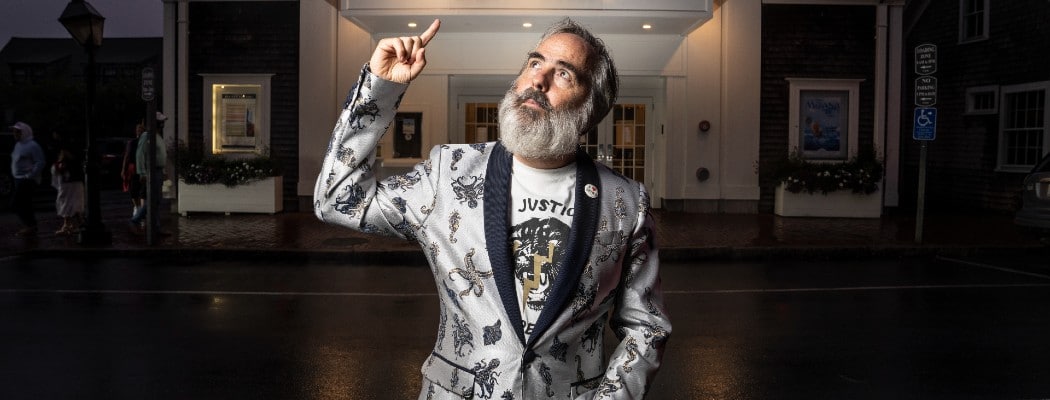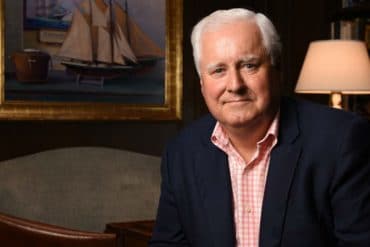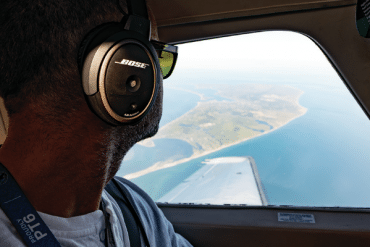Donick Cary’s wild trip to show business.
Donick Cary’s brain is wired differently than most of ours. Whether it was creating zany skits for David Letterman as one of Late Night’s head writers, throwing Homer Simpson into hilarious situations as one of the producers of The Simpsons, or most recently writing and directing a feature-length documentary about psychedelic drugs, Cary has built a life and career that has been anything but scripted. And it continues to this day. When he was asked to speak at the Nantucket Yacht Club earlier this summer, Cary arrived by boat bearing a homemade Jolly Roger flag complete with dollar signs for eyes. While his entrance into show business some thirty years ago might not have been nearly as swashbuckling, the story is no less entertaining.
 The son of professional actors Richard and Mara Cary, who, after their divorce, competed for headlines by running rival theater companies on the island, Cary was drawn to the stage early on. He particularly loved making people laugh and soon began consuming a steady diet of Monty Python, Charlie Chaplin and Bill Murray movies. “I knew I wanted to pursue comedy in some way,” he said. “The magic of growing up on Nantucket is that people from all over the world pass through here, so if you’re looking to pursue something, you’ll probably cross paths with someone doing it.”
The son of professional actors Richard and Mara Cary, who, after their divorce, competed for headlines by running rival theater companies on the island, Cary was drawn to the stage early on. He particularly loved making people laugh and soon began consuming a steady diet of Monty Python, Charlie Chaplin and Bill Murray movies. “I knew I wanted to pursue comedy in some way,” he said. “The magic of growing up on Nantucket is that people from all over the world pass through here, so if you’re looking to pursue something, you’ll probably cross paths with someone doing it.”
When Cary was sixteen years old, his father was producing a dance troupe from New York City. In those days, Cary would lend a hand by driving the talent to and from the shows. Behind the wheel of Michael Kopko’s old 1972 Buick Skylark complete with incomplete brakes, he’d keep his guests entertained with jokes as he pointed out which watering holes they should hit after the show. “Oh, you’re so funny,” one of the dancers gushed. “You have to meet my husband…you guys would really hit it off!” Cary accepted her invitation and was later introduced to her husband Steve O’Donnell, one of the head writers on Late Night with David Letterman. “It was one of those lightning moments in life where you know you’re going to remember this,” Cary said.
While O’Donnell didn’t line Cary up with a gig at Letterman that night, the serendipitous meeting put the career path of being a television writer in his mind, so that when Cary was a junior in college, he took a year off to pursue an internship at the Late Night show. After that, there was no turning back. “I found the house I wanted to live in,” he said of being on the set of Letterman, “and did everything I could to fit in and stay.” Cary worked his way up from being a lowly intern in the graphics department to serving as O’Donnell’s writing assistant to then becoming a writer himself. All of a sudden, he was writing skits for his comedy heroes like Bill Murray and rubbing elbows with icons like Johnny Cash and Madonna. His favorite skit was of Letterman stacking mashed potatoes on his head and then going to the NBC payroll and impersonating Phil Donahue to pick up his paycheck. “Every day was a carnival of fun,” he said. “This was in the middle of the talk show wars with [Jay] Leno, so it was a very interesting time to be working with David Letterman.”
 Eventually, Cary got promoted to head writer and worked directly with Letterman on a daily basis. “Dave is hard to work with,” Cary said. “He’s incredibly smart, one of the funniest human beings on the planet, but he’s fueled by his own self-criticism.” Ironically, as head writer, Cary found himself doing a whole lot less writing. On top of managing the stable of writers below him, he became pseudo-therapist to Letterman, juggling his emotions, expectations and frequent mood swings. What started as a dream job fueled by creativity became a chore producing toxic amounts of stress. “I was twenty-six years old, but I felt like I was eighty,” he said. Cary’s body began failing him. He was diagnosed with an immune system disease, which he believed was brought on by the stress. “I always thought that if I got a job at Letterman I would never leave,” he said. But when an opportunity came his way to write for The Simpsons, Cary jumped ship.
Eventually, Cary got promoted to head writer and worked directly with Letterman on a daily basis. “Dave is hard to work with,” Cary said. “He’s incredibly smart, one of the funniest human beings on the planet, but he’s fueled by his own self-criticism.” Ironically, as head writer, Cary found himself doing a whole lot less writing. On top of managing the stable of writers below him, he became pseudo-therapist to Letterman, juggling his emotions, expectations and frequent mood swings. What started as a dream job fueled by creativity became a chore producing toxic amounts of stress. “I was twenty-six years old, but I felt like I was eighty,” he said. Cary’s body began failing him. He was diagnosed with an immune system disease, which he believed was brought on by the stress. “I always thought that if I got a job at Letterman I would never leave,” he said. But when an opportunity came his way to write for The Simpsons, Cary jumped ship.
 The Simpsons introduced Cary to the long form of animation. Coming from the hectic pace of late-night television, the nine-month process of creating a season of the animated show was a welcome reprieve. Cary’s four-year tenure at The Simpsons, added to his time at Letterman, solidified his stature as a top writer in show business. He’d go on to create and write dozens of pilots, including one based on his childhood on Nantucket that he titled “The Off-Season.” “I handed in this pilot to the Fox executives and they said ‘this doesn’t seem real,’” Cary recalled. “They started giving me notes; I didn’t realize you had to listen to them.” The show never got made, but it didn’t slow his ascension. Cary proceeded to write on a number of hit sitcoms like Just Shoot Me, Parks and Recreation and New Girl. During the end of the Bush presidency, he created an animated show for Comedy Central called Lil’ Bush, which ran for two seasons with Cary voicing the character of Lil’ Dick Cheney.
The Simpsons introduced Cary to the long form of animation. Coming from the hectic pace of late-night television, the nine-month process of creating a season of the animated show was a welcome reprieve. Cary’s four-year tenure at The Simpsons, added to his time at Letterman, solidified his stature as a top writer in show business. He’d go on to create and write dozens of pilots, including one based on his childhood on Nantucket that he titled “The Off-Season.” “I handed in this pilot to the Fox executives and they said ‘this doesn’t seem real,’” Cary recalled. “They started giving me notes; I didn’t realize you had to listen to them.” The show never got made, but it didn’t slow his ascension. Cary proceeded to write on a number of hit sitcoms like Just Shoot Me, Parks and Recreation and New Girl. During the end of the Bush presidency, he created an animated show for Comedy Central called Lil’ Bush, which ran for two seasons with Cary voicing the character of Lil’ Dick Cheney.
Throughout that time, Cary and his wife Kim remained committed to Nantucket, splitting their year between the island and Los Angeles. He was particularly involved in the Nantucket Film Festival, which nurtured his passion for documentaries and ultimately sparked the idea for his first feature-length film. Eleven years ago, he was attending a film festival event when actor Ben Stiller told a story on stage about a bad acid trip he experienced. The highly entertaining story got Cary thinking about why these psychedelic tales aren’t told more often in public. So began a decade-long saga filming a documentary about the use of psychedelics, which debuted on Netflix last year. Have a Good Trip explores the world of psychedelic drugs through interviews with a slew of big-name figures, including Sting, Sarah Silverman, Carrie Fisher, Deepak Chopra and Anthony Bourdain. The film also delves into the groundbreaking uses of psychedelics in treating depression, PTSD and addiction. Have a Good Trip garnered a huge audience and has since become a platform to disseminate information about these powerful psychedelic compounds.
 Most recently, Cary has been working on a new documentary that centers on the renaming of the Washington Football Team, formerly known as the Redskins. Before being raised on Nantucket, Cary was born in Washington, D.C., and has remained a devoted fan of the team his whole life. When the team’s original name came under fire as being racist and derogatory toward Native Americans, a national debate emerged, which Cary and his son Otis also took up in their own home. Their conversations inspired a four-year project, traveling to reservations and speaking with Native Americans. Much like when diving into the world of psychedelics, Cary found a much bigger story to tell than simply determining whether a football team’s mascot was racist. In the context of the racial reckoning happening in the country, Cary expanded the scope of the film to contribute to the national conversation and doing so in his own comedic way.
Most recently, Cary has been working on a new documentary that centers on the renaming of the Washington Football Team, formerly known as the Redskins. Before being raised on Nantucket, Cary was born in Washington, D.C., and has remained a devoted fan of the team his whole life. When the team’s original name came under fire as being racist and derogatory toward Native Americans, a national debate emerged, which Cary and his son Otis also took up in their own home. Their conversations inspired a four-year project, traveling to reservations and speaking with Native Americans. Much like when diving into the world of psychedelics, Cary found a much bigger story to tell than simply determining whether a football team’s mascot was racist. In the context of the racial reckoning happening in the country, Cary expanded the scope of the film to contribute to the national conversation and doing so in his own comedic way.
“It’s a little counterintuitive to say ‘here’s something horrific, let’s laugh about it.’ That’s certainly not the intention,” Cary explained when asked how humor can be used in addressing serious topics like racism. “As humans, we don’t want to do things that are uncomfortable. But traditionally, doing things that are uncomfortable is how we’ve evolved and become better humans. One of the ways that gets us to do those things is if we laugh about it. Maybe you can then listen a little more and bring your guard down a bit…I love that part of comedy. That comedy can help bring you into things that you might ignore or run away from.”
To listen to Donick Cary’s Nantucket Sound podcast interview on Apple Podcasts click here. To listen on Spotify click here.







